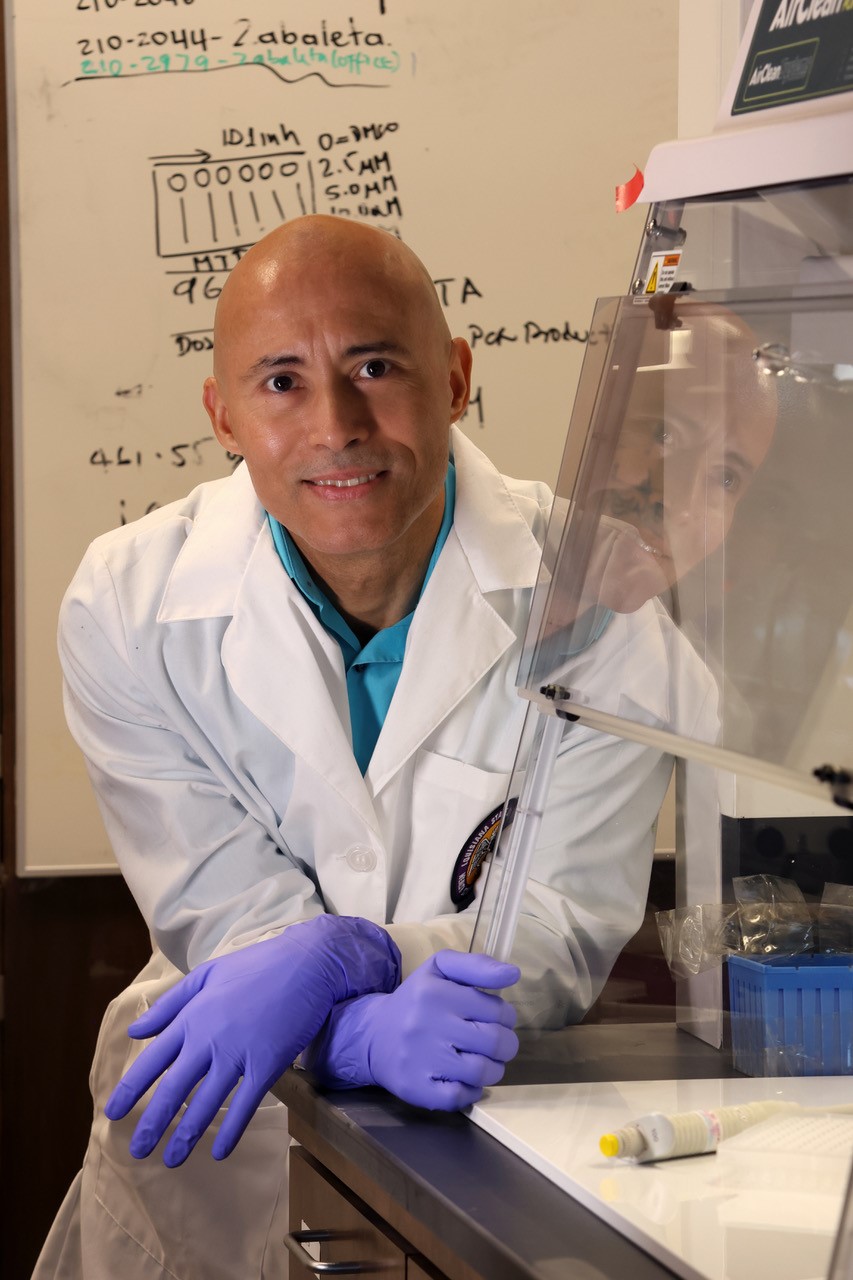Cancer Research in Minority Populations With Dr. Jovanny Zabaleta
August 21, 2023
Your body is full of proteins, genes, and other substances called biomarkers, which can reveal important information about your health. Cancer biomarkers can provide insight into a person’s cancer (such as its likelihood of spreading, which treatments will be most effective, and how treatment is working), a person’s risk for developing certain kinds of cancer, and the chances of a person’s cancer returning.
Jovanny Zabaleta, MS, Ph.D., Associate Professor, Department of Interdisciplinary Oncology, LSU LCMC Health Cancer Center and head of the Translational Genomic Core, has studied biomarkers for over twenty years. In particular, he’s interested in how biomarkers play a role in how and why minority populations are more likely to develop certain cancers or more aggressive forms of cancer.
By understanding these biomarkers, cancer could be caught in earlier stages — or before it even becomes cancer. “Once you have cancer, you have cancer,” Dr. Zabaleta explains. “There's only so many options you have. But in pre-cancer stages, you have plenty more opportunities to intervene.”
In particular, Dr. Zabaleta’s research focuses on breast, colorectal, cervical, and gastric cancers. Though as with all cancer research, these findings also provide insight into cancer in general.
Through collaborations around the globe and the support of LSU LCMC Health Cancer Center, Dr. Zabaleta and his team have found links between certain biomarkers and cancer, specifically among minority populations, including those of African American, Hispanic, and Native American descent.
Biomarkers and Cancer in Minority Populations
Cancer disparities are differences in cancer measures, such as new cases, years of survival after diagnosis, and deaths. Disparities exist in many groups, including different races and ethnicities.
For instance, African American people are more likely to die from many kinds of cancer compared to all other racial/ethnic groups. When it comes to cervical cancer, Hispanic and African American women have higher rates compared to women in other racial/ethnic groups.
The causes of cancer disparities are not straightforward. There are a number of factors at play, including access to healthcare, socioeconomic status, lifestyle choices, and geographic location. While Dr. Zabaleta’s research considers these factors, especially obesity, genetics is his primary focus.
When Dr. Zabaleta first began his research decades ago, it wasn’t widely accepted that genetics could be associated, somehow, with cancer health disparities. “You have to convince people with facts that there's actually something going on there,” he explains. “Because when clinical and sociodemographic variables are accounted for, there are still differences in the presentation of cancer.”
Among the many findings in his research, one is a specific gene in African Americans that is associated with increased inflammatory responses and gastric cancer. Inflammation is a key part of cancer, including how it develops, spreads within the body, and responds to treatment.
“When you have this specific array in this genetic block, and one of these inflammatory genes, you’re prone to develop more inflammatory diseases. This inflammatory response is associated with damage in the tissue,” explains Dr. Zabaleta. “We were focusing on the preliminary stages, which is where intervention should be directed.”
By detecting biomarkers for cancer early, there are more options, such as reducing inflammation or the number of bacteria in a patient.
Dr. Zabaleta detected other biomarkers that may put minority patients at a higher risk of cancer. The genetic array in colorectal cancer also shows up in gastric cancer, specifically in Hispanic patients who have higher African ancestry. As for breast cancer, he found an array of genes related to the luminal B subtype of breast cancer in Hispanic women and another in women with Native American ancestry.
How Dr. Zabaleta's Research is Supporting Minority Students
Minority populations — including African Americans, Hispanics, American Indians, Native Hawaiians, and Pacific Islanders — have long been underrepresented in biomedical research. Dr. Zabaleta, being from Colombia and part of a minority population himself, understands how this can make career opportunities more challenging for budding researchers.
Leveraging partnerships in Colombia, Mexico, and other parts of the world, Dr. Zabaleta has brought students to LSU LCMC Health Cancer Center, where he can mentor and support them in their research. To date, he has brought over twenty students from Colombia alone.
“I have tried to keep students from minority backgrounds in the lab also doing minority research,” he explains. “I want to open their eyes and see — I did this, you can also do this.”
Once in Louisiana, Dr. Zabaleta can offer not just his guidance but also the diverse population in Louisiana.
“Louisiana is like the gumbo of genetic ancestral backgrounds,” he says. “You have African Americans, European Americans, Hispanics, Creoles, Cajuns. And, you have all these social determinants of health, like the risks associated with the petrochemical industry. It’s a melting pot of everything involving genetics and environment.”
In addition to genetic diversity, Louisiana also grapples with high cancer rates. “It's important that we are here in New Orleans. We have all these factors that, put together, increase the prevalence of cancer.”
Continuing Cancer Research in Minority Populations
Cancer disparities exist for many reasons. Dr. Zabaleta’s research is aimed at removing factors that put certain populations at risk of developing cancer or more aggressive forms of cancer.
“This differential presentation of diseases is because of so many things — genetics, environment,” he says. “But if we remove all those things and work with what is common, can we find a common ground to treat everybody with the same tools, the same efficacy, and the same good outcomes?”
Moving forward, Dr. Zabaleta will continue to focus on genetic predispositions to cancer in minority populations. He also plans to bring even more minority students to Louisiana to provide them with the opportunities he has had throughout his own career.
